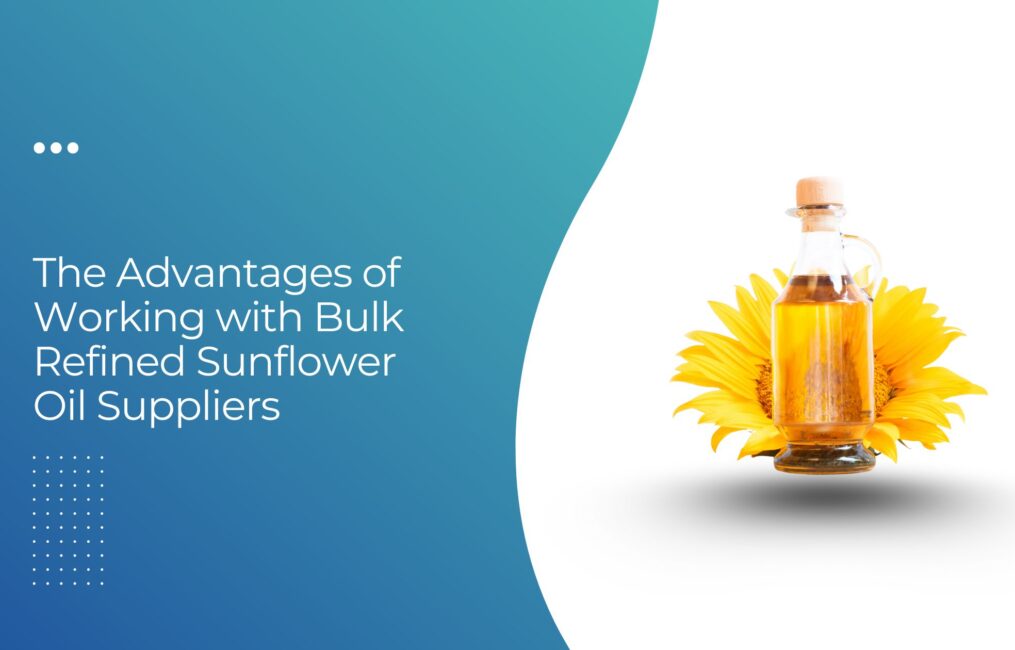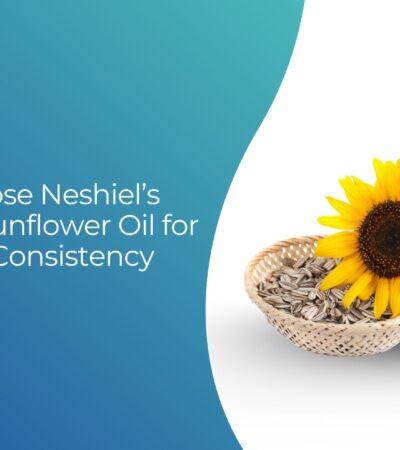The Advantages of Working with Bulk Refined Sunflower Oil Suppliers

In today’s fast-changing food and manufacturing industries, edible oils are more than just cooking ingredients—they’re vital raw materials that impact everything from flavor to shelf life to customer trust. Among the wide range of edible oils, refined sunflower oil has carved out a special place. It’s light in texture, neutral in taste, and loaded with Vitamin E, making it the go-to choice for households, restaurants, and large-scale food producers alike.
But here’s the real challenge: how do businesses source sunflower oil in a way that’s cost-effective, consistent, and reliable?
That’s where working with bulk refined sunflower oil suppliers comes into the picture. For procurement teams and manufacturers, bulk suppliers aren’t just vendors—they’re strategic partners who bring stability, savings, and scale to the entire procurement process. In this blog, we’ll break down the many advantages of choosing bulk suppliers, explore how they simplify edible oil procurement, and highlight why companies like Neshiel Agrochem are trusted across industries.
What Do We Mean by Bulk Refined Sunflower Oil Suppliers?
When we say “bulk refined sunflower oil suppliers,” we’re talking about large-scale providers who specialize in supplying sunflower oil in significant quantities. Unlike smaller distributors or retail vendors, these suppliers operate on an industrial scale. They refine, package, and deliver oil in bulk formats such as flexitanks, drums, or jerry cans, often starting at a minimum order of 30 MT or more.
Here’s why they matter:
- They have the infrastructure to handle large orders consistently.
- Their processes are standardized to maintain quality across batches.
- They provide pricing advantages by leveraging economies of scale.
For businesses, especially those with continuous production lines like snack manufacturers, QSR chains, or exporters, bulk suppliers become the backbone of an efficient supply chain.
Why Bulk Matters in Edible Oil Procurement
Procurement isn’t just about buying—it’s about buying smart. In the edible oil sector, small-scale sourcing may work for a household, but businesses require stability, predictability, and compliance.
Working with bulk refined sunflower oil suppliers helps procurement teams solve common issues such as:
- Fluctuating supply that causes production delays.
- Inconsistent quality that affects product taste and shelf life.
- Higher hidden costs from smaller, repeated purchases.
- Compliance risks when documentation or certifications aren’t available.
By consolidating purchases through bulk suppliers, companies reduce complexity and gain better control over both cost and quality.
Also read: Sustainable Edible Oil Procurement: Meeting Market Demand Responsibly
Advantages of Partnering with Bulk Refined Sunflower Oil Suppliers
Let’s dive deeper into the concrete benefits businesses enjoy when they choose to work with bulk refined sunflower oil suppliers.
1. Cost Efficiency Through Economies of Scale
One of the biggest advantages of buying in bulk is cost savings. Bulk suppliers operate large refineries and purchase raw materials in high volumes, which means they can refine and distribute oil at lower per-unit costs. For buyers, this translates into:
- Lower procurement costs per liter.
- Better bargaining power for long-term contracts.
- Reduced shipping costs when transporting full container loads.
Over time, these savings make a significant difference in the profitability of food manufacturers and distributors.
2. Consistent Quality and Standardization
Imagine producing a batch of biscuits where the oil tastes slightly different from the last batch. It could affect the texture, flavor, and even consumer trust in your brand.
Bulk refined sunflower oil suppliers prioritize consistency. Their large-scale refining processes, strict laboratory testing, and quality management systems ensure every batch meets the same specifications. Certifications like ISO, HACCP, and FSSAI further assure buyers of international-grade quality.
Consistency means fewer production surprises, happier consumers, and stronger brand credibility.
3. Supply Reliability & Reduced Risk of Stockouts
Small vendors may struggle to fulfill sudden large orders. Bulk suppliers, on the other hand, usually have strong storage facilities and efficient logistics. This allows them to manage fluctuations in demand without disrupting your operations.
For procurement managers, this reliability reduces the nightmare of production halts due to delayed shipments. Whether it’s a domestic manufacturer or an exporter catering to overseas markets, having a bulk supplier ensures business continuity.
4. Streamlined Procurement Process
Managing multiple small suppliers can be time-consuming. From negotiating prices to handling invoices and monitoring deliveries, it adds layers of complexity.
Bulk refined sunflower oil suppliers simplify this by acting as single-source partners. Procurement becomes more efficient with:
- Fewer vendor relationships to manage.
- Standardized contracts for larger volumes.
- Easier forecasting and planning.
This kind of streamlined process saves both time and administrative costs for procurement teams.
5. Long-Term Pricing Stability
Global edible oil prices are highly volatile due to weather conditions, currency fluctuations, and geopolitical events. For businesses, this unpredictability can be a major challenge.
Bulk suppliers offer an advantage by providing forward contracts and long-term pricing agreements. By locking in stable rates, procurement teams can budget more effectively and protect themselves against sudden price spikes.
6. Advanced Logistics & Distribution Capabilities
Transporting edible oil is not as simple as moving cartons of goods. Oil requires careful handling, airtight packaging, and sometimes even temperature control to maintain quality.
Bulk suppliers have the expertise to:
- Package oil securely in drums, flexitanks, or bulk containers.
- Optimize shipping routes to reduce transit time.
- Handle customs documentation and international regulations for export.
This makes them the ideal choice for businesses looking at both domestic supply and overseas markets.
7. Traceability, Compliance, and Certifications
In today’s market, buyers and end consumers demand transparency. They want to know where their food comes from and whether it meets safety standards.
Bulk refined sunflower oil suppliers provide complete documentation, including:
- Certificates of Analysis (COAs) for every batch.
- International certifications like ISO, HACCP, and FSSAI.
- Traceable sourcing records that assure buyers of authenticity.
For procurement teams, this means fewer compliance headaches and more confidence in their supply chain.
8. Flexibility and Customization
Another advantage bulk suppliers bring is the ability to customize. Whether it’s specific packaging (like 25-liter jerry cans for hotels or flexitanks for exporters) or supplying different grades of sunflower oil (such as high-oleic versions), bulk suppliers can adapt to unique buyer needs.
This flexibility gives businesses the confidence that they can grow and evolve without needing to constantly change suppliers.
9. Market Insights and Negotiating Leverage
Large suppliers often have direct relationships with farmers, crushers, and global traders. This puts them in a better position to forecast market trends, anticipate price changes, and share insights with buyers.
Procurement teams benefit from these insights by making smarter buying decisions, negotiating better deals, and planning ahead to avoid risks.
10. Simplified Risk Management
Working with many small vendors often creates confusion about accountability. If a quality issue arises, it can be hard to pinpoint responsibility. With bulk suppliers, the responsibility is clear—they own the process from refining to delivery.
This single-point accountability makes dispute resolution easier and strengthens buyer-supplier trust.
The Risks of Not Using Bulk Refined Sunflower Oil Suppliers
While we’ve explored the many advantages of working with bulk suppliers, it’s also important to understand the risks businesses face when they rely on smaller or fragmented vendors.
1. Inconsistent Quality
Smaller vendors often lack standardized refining processes, meaning one batch might differ significantly from the next. This inconsistency can affect food texture, taste, and even shelf life.
2. Higher Hidden Costs
At first glance, buying smaller quantities might seem cheaper. But when you add transportation, multiple handling charges, and repeated administrative costs, it often turns out to be more expensive in the long run.
3. Supply Disruptions
Small vendors may not have the capacity to handle large, urgent orders or buffer stocks. This increases the risk of production delays, which can be costly for manufacturers.
4. Compliance Gaps
Lack of certifications, proper documentation, or traceability can lead to regulatory issues. For companies exporting food products, this could even mean rejected shipments.
5. Weak Negotiating Power
Without bulk contracts, procurement teams miss out on long-term pricing stability and the ability to negotiate better deals.
In short, avoiding bulk suppliers often leads to higher costs, lower quality, and increased risks—three things no procurement manager wants on their plate.
How to Evaluate and Select the Right Bulk Supplier
Not all bulk refined sunflower oil suppliers are created equal. Choosing the right one requires a careful evaluation process. Here’s a checklist that procurement teams can follow:
1. Quality Assurance and Certifications
- Does the supplier provide ISO, HACCP, and FSSAI certifications?
- Are lab test reports (COAs) shared with every batch?
- Is there traceability back to the source?
2. Infrastructure and Capacity
- Can they handle large, regular orders without disruption?
- Do they have proper warehousing and logistics networks?
- Are they experienced in export operations if needed?
3. Transparency and Documentation
- Do they provide clear contracts with defined terms?
- Is pricing transparent, with no hidden charges?
- Do they share clear information on packaging and shipping?
4. Flexibility and Customization
- Can they supply in different formats like drums, flexitanks, or jerry cans?
- Do they offer specialized grades such as high-oleic sunflower oil?
- Can they adapt to seasonal or market-based procurement needs?
5. Reputation and Track Record
- Do they have long-term partnerships with reputed clients?
- Are they known for delivering consistently on time?
- Do they have case studies or testimonials from industries similar to yours?
By using this checklist, procurement teams can confidently select a supplier that aligns with both operational and strategic goals.
Also read: Refined Sunflower Oil Procurement: Strategies, Challenges and Future Outlook
Why Neshiel Agrochem is a Trusted Bulk Refined Sunflower Oil Supplier
Now that we’ve covered the evaluation criteria, let’s see how Neshiel Agrochem measures up.
1. Commitment to Quality
Neshiel’s refined sunflower oil undergoes rigorous refining and quality checks. Every batch is certified, tested, and compliant with global standards. The result: oil that is consistent, safe, and reliable.
2. Strong Infrastructure and Logistics
With minimum order quantities of 30 MT, Neshiel is designed for bulk procurement. Whether it’s domestic supply or international export, their logistics systems ensure timely delivery with proper packaging.
3. Transparency and Traceability
Procurement teams receive full documentation—from batch reports to certifications—making audits and regulatory compliance stress-free.
4. Flexibility in Procurement
Neshiel offers customizable solutions, from different packaging sizes to flexible contract terms, ensuring businesses of all sizes can benefit.
5. Proven Track Record
Over the years, Neshiel has built lasting partnerships with manufacturers, distributors, and exporters worldwide. Their client-first approach makes them more than just a supplier—they’re a reliable partner in edible oil procurement.
Best Practices When Working with Bulk Suppliers
Even after choosing the right supplier, success depends on how you manage the relationship. Here are some tips:
- Forecast Clearly: Share demand estimates to help suppliers plan production.
- Audit Periodically: Regular checks maintain quality and compliance.
- Dual Sourcing Strategy: While bulk suppliers are reliable, keeping a secondary backup reduces risk.
- Negotiate Smartly: Include clauses for flexibility, penalties, and dispute resolution in contracts.
- Leverage Technology: Use digital procurement platforms for monitoring and tracking shipments.
Conclusion
In the competitive world of food and manufacturing, reliable sourcing of edible oils can make or break a business. Choosing to work with bulk refined sunflower oil suppliers is more than a procurement choice—it’s a strategic decision that impacts cost, quality, and supply stability.
By partnering with an experienced supplier like Neshiel Agrochem, businesses not only secure consistent access to high-quality refined sunflower oil but also gain a trusted ally in navigating the challenges of edible oil procurement.
So, whether you’re a manufacturer, distributor, or exporter, the advantages of working with bulk suppliers are clear: lower costs, higher quality, and stronger business continuity.
FAQs
Q1. What is the minimum procurement quantity with Neshiel Agrochem?
The minimum order is 30 MT, ideal for manufacturers, distributors, and exporters.
Q2. Can bulk refined sunflower oil suppliers provide custom packaging?
Yes. Packaging can be customized—drums, jerry cans, flexitanks—depending on your requirements.
Q3. How does Neshiel ensure batch-to-batch consistency?
Every batch is tested in certified labs, and Certificates of Analysis (COAs) are shared with buyers.
Q4. Is refined sunflower oil suitable for non-food applications?
Absolutely. It’s widely used in cosmetics, skincare, and pharmaceuticals due to its purity.
Q5. How does working with bulk suppliers save costs?
Through economies of scale, forward contracts, reduced logistics expenses, and standardized procurement.



